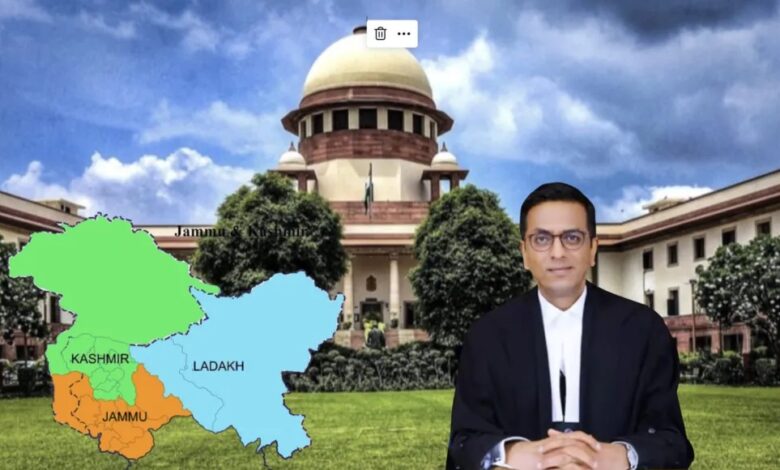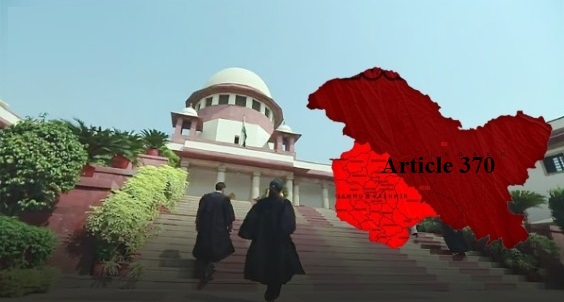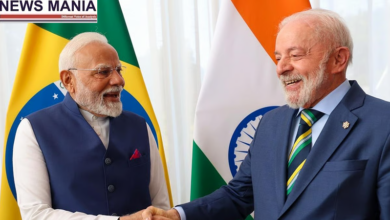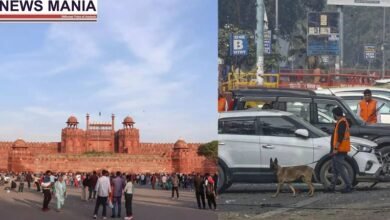Supreme Court upholds the abrogation of Article 370, says it is a ‘temporary provision’

A Constitution Bench headed by Chief Justice of India (CJI) D.Y. Chandrachud on Monday unanimously upheld the Central government’s 2019 decision to abrogate Article 370 of the Constitution which conferred special status on the erstwhile State of Jammu and Kashmir (J&K).
Pointing out that Article 370 is a ‘temporary provision’, the Bench said that it was enacted due to wartime conditions in the State and was meant to serve a transitional purpose.
The Bench pronounced three verdicts – one by CJI DY Chandrachud for himself and Justices Gavai and Surya Kant. Whereas, Justices SK Kaul and Sanjiv Khanna have authored two separate concurring judgments.
The court held that J&K did not retain any internal sovereignty after its integration and that the concurrence of the State Government was not required to apply the Indian Constitution to the State.
In light of Solicitor General Tushar Mehta’s submission that the government plans to restore J&K’s statehood as soon as possible, the court did not adjudicate upon the validity of the reorganization of the State into the Union Territories of J&K and Ladakh . However, it upheld the carving out of Ladakh as a Union Territory.
The court also directed the Election Commission of India to take steps to conduct elections to the J&K Legislative Assembly by September 30, 2024.
Justice S.K. Kaul in his concurring judgment recommended the constitution of an impartial Truth and Reconciliation Commission to investigate and report on the violations of human rights both by the State and non-state actors since the 1980s. The Commission has been tasked to suggest measures for reconciliation in a time-bound manner.

CJI’s judgment, in a nutshell
Chief Justice Chandrachud, and Justices Gavai and Surya Kant form the lead judgment.
- J&K did not retain internal sovereignty or element of sovereignty after the proclamation of November 22, 1949.
- President and Parliament are not impeded to take over as Governor/State Legislature after proclamation under Article 356.
- Article 370 is only a temporary provision. The Bench rejects petitioners’ arguments that Article 370 was of a permanent character and beyond the amending powers of the Parliament.
- The CJI-authored judgment holds that the power of the President to notify the abrogation of Article 370 subsists even after the dissolution of the Constituent Assembly of Jammu and Kashmir.
- The CJI notes that Article 370 was only a provision to take care of the transition from a princely State to the Union. It was an interim arrangement to tide over the war at the time. Even the textual reading of Article 370 shows it as a temporary provision.
- Concurrence of the State legislature not required to apply all the provisions of the Indian Constitution to Jammu and Kashmir. The President/Centre not wrong in not taking concurrence of the State legislature.
- The Constitution of J&K is now inoperative. It was only made to fill “gaps” in the Indian Constitution concerning the State. After abrogation of A 370 and application of the entire Indian Constitution to the State, the J&K Constitution implicitly serves no purpose.
- No need to examine whether J&K Reorganization Act after Solicitor General, appearing for Centre, said the Union Territory of J&K would be returned to Statehood.
- Elections to Jammu and Kashmir Assembly should be held before September 30, 2024.
CJI Chandrachud outlines the conclusions reached by the bench in the verdict
1) The State of J&K does not retain any element of sovereignty. It does not have internal sovereignty. Article 370 is a feature of asymmetric federalism and not sovereignty.
2) The Petitioners did not challenge the Presidential Proclamation.
3) The exercise of the President’s power after the proclamation is subject to judicial review.
4) The power of the Parliament under Article 356(1) to exercise powers on behalf of the State Assembly is not restricted to the law-making powers.
5) Article 370 is a temporary power.
6) The power under Article 370(3) did not cease after the J&K Constituent assembly ceased to exist.
7) Article 370 cannot be amended by exercise of power under Article 370(1)(d).
8) Para 2 of CO 272 amending Article 367 is ultra vires because it modifies Article 370 in effect.
9) The exercise of power by the President under Article 370(1)(d) is not mala fide. The President did not have to obtain the concurrence of the State and can act on the Union’s concurrence.
10) Para 2 to CO 272 applying all provisions of the Constitution to J&K is valid.
11) The President had the power to issue a notification declaring that Article 370 ceases to operate without a recommendation of the J&K Constituent Assembly. It is a culmination of the integration process.
12) The views of the State legislature under Article 3 proviso are recommendatory.
13) Since the Solicitor General stated that the statehood of J&K will be restored except for the carving out of the Union Territory of Ladakh, this issue is left upon.
(This story has not been edited by News Mania staff and is published from a Media Release)






